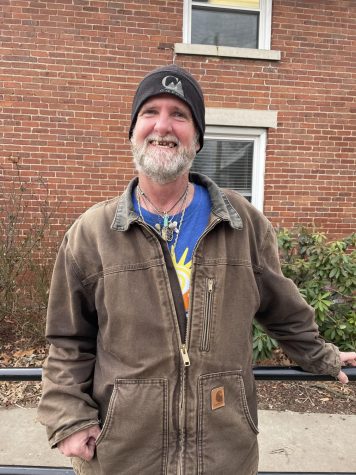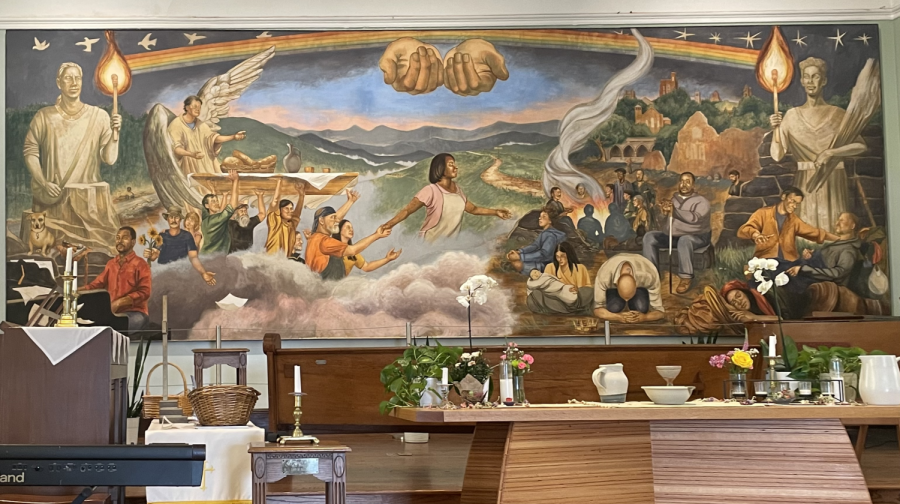Volunteers patrol Asheville to welcome unhoused people inside from the cold
The mural adorning the back wall inside the Haywood United Methodist Church depicts 30 individuals combating homelessness.
January 19, 2023
As temperatures drop below freezing, volunteers patrol the streets of Asheville seeking out any unhoused person who would like to stay in a shelter for the night.
“We welcome anybody that wants to help because doing the right thing is universal, it transcends any religious beliefs you have, group that you represent or special interests you have,” said Tim McElyea, the director of homeless services at ABCCM.
Over 600 people are without housing in Asheville, with 232 of them being unsheltered, living in tents, cars or sleeping on the street, according to the 2022 Point-in-Time Count.
“Code Purple is a community initiative where when the temperature drops below 32 F, we open our shelters up to take people, anybody who wants to come in and is in need of emergency housing to get out of the cold,” McElyea said.
The Code Purple is announced by the Asheville Homeless Coalition Co-Chair 48 hours before the event occurs. During these events, the ABCCM Veterans Restoration Quarters and Transformation Village accepts people from 4 p.m. to 8 p.m., offering overnight shelter until 7:30 a.m.
“We have several vans and we’ll go out on the street when the temperatures are sub-freezing and actively look for people, try to pick people up and bring them into a shelter if they want to come. If they don’t, we have supplies in our van like food, coats, blankets, hats and gloves that we’ll hand out to people to try to help them stay safe and warm during the night, but also encourage them to come in and provide them with resources,” McElyea said.
During Code Purple events, free transportation is offered by Asheville Rides Transit (ART) buses from 3:30 p.m. to 6. p.m.
“Here at the Veterans Restoration Quarters, I have 50 plus beds to use for men. For women and children we have another 50 beds at Transformation Village,” McElyea said.
The number of individuals in Asheville without residence has increased by 21% since 2021, according to the Point-in-Time Count.
“Getting people engaged in resources is huge. I think as an individual in the community living here you should know the resources that are available. When you see people, refer them to those resources,” McElyea said.
On Jan. 25 there will be a joint city and county meeting regarding the needs assessment and strategies to improve the response to homelessness. It will be held at Harrah’s Cherokee Center in Asheville, from 1 p.m. to 4 p.m.
“We have city and county funding, but the rest is through private donations and support of our many volunteers and churches, because without them we couldn’t do it at all. Even with funding from the city and county it wouldn’t be enough to do it,” McElyea said.
On May 10, 2022, the City Council voted to accept funding from Dogwood Health Trust through a contract with the National Alliance to End Homelessness, according to the City of Asheville Homelessness strategy.
“I think the biggest thing I can recommend is folks knowing resources and where to tell people to go to get help and assistance, because if we can engage people that’s the first step of getting them into permanent housing, a more permanent situation, and what the case may be,“ McElyea said.
Unhoused individuals are more at risk for developing exposure-related illness such as hypothermia and frostbite, potentially affecting extremities which may lead to amputation if left untreated, according to the CDC.
Jerry Weeks is a 65-year-old unhoused man. Weeks said he sleeps outside often and when the ground is frosted, he ignites hand sanitizer in a bottle with a cloth, placing it under or near his blanket to keep warm.
According to the Boston Health Care for the Homeless program, individuals who have a history of exposure-based conditions are eightfold increased risk of dying than matched controls.
“It’s icy cold, you can watch the water freeze, anything that’s freezable,” said Weeks.

Chuck Simms, also known as “Woodchuck,” has been unhoused for six years after being kicked out of his former home. He said he utilizes the facilities offered during Code Purple events, visiting participating organizations eight times so far.
“When it’s down to 0° or cooler, it’s hard to bundle up if you don’t have a tent or a lot of people don’t even have blankets or sleeping bags. I feel blessed, but I feel sorry for all my other brothers and sisters,” Simms said.
Dressing in layers, covering exposed skin and seeking shelter from wind are recommended strategies to reduce the risk of frostbite and hypothermia, according to the National Weather Service.
“What is given and passed out between churches and organizations is very helpful. If I don’t need it I pass it on to somebody else that needs it, I try to help anybody out to find food or where different things are because they don’t know,” Simms said.


![Brooke Pedersen [second from the right] and Luis Reyes [right] hold banners during the Wrap The Woods event.](https://thebluebanner.net/wp-content/uploads/2025/09/ELIZABETH_PRITCHITT_IMG_3470-1200x804.jpg)















